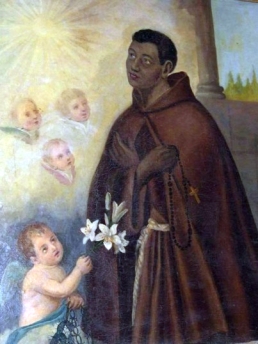Lives of the Saints
Our Models and Protectors
Spiritual Bouquet:
April 4

Saint Benedict of Palermo
Premonstratensian Lay Brother
(1526-1589)
Saint Benedict the Moor, born in Sicily around 1526, belonged to the African race. His parents were Christians, living in an ancient town of Sicily today named San Fratello (Holy Little Brother), in memory of our Saint. By their virtues they possessed the liberty which belongs to all the true children of God, in whatever condition they may be. They had determined to live in continence, in order not to bring children into their own condition, that of slaves according to the flesh. But when their master promised to liberate their firstborn, heaven gave them Saint Benedict.
From his childhood Benedict manifested a great love for the Blessed Virgin and an ardent charity. In his life as a young shepherd he often became absorbed in prayer and spent long hours on his knees on the plains. He thus attracted the persecution of his comrades, in whose games he did not participate. One day a pious hermit named Brother Jerome passed by, and saw the young man, object of the mockeries of his neighbors. He reproached them, and told them that one day they would hear again of the one they were treating so contemptuously.
To follow the Saviour in His poverty, Benedict went to Brother Jerome in his hermitage, having sold his meager possessions, as Our Lord in the Gospel invites to do. Soon the two hermits were joined by others, and their reputation brought a large concourse of visitors. They then retired to Monte Pellegrino near Palermo. In 1562 the hermits were united by the Pope to the Order of Saint Francis, and Saint Benedict aided in the reform which was beginning at that time.
He was noted everywhere for his penances. Miracles followed whenever he was sent out to beg for the Community. Still a simple lay Brother, he was named Guardian of his convent in 1578, a delicate position, for he had to govern priests. Much can be supposed of Saint Benedict's character and competence, when one knows that in this office he won all hearts. Everywhere miracles were accompanying his passage. At the end of his term as superior he became master of novices, later returning again to the kitchen, where many continued to visit him. He died in April of 1589, and countless miracles occurred at his tomb. Pius VII canonized him two centuries later.
Les Petits Bollandistes: Vies des Saints, by Msgr. Paul Guérin (Bloud et Barral: Paris, 1882), Vol. 4